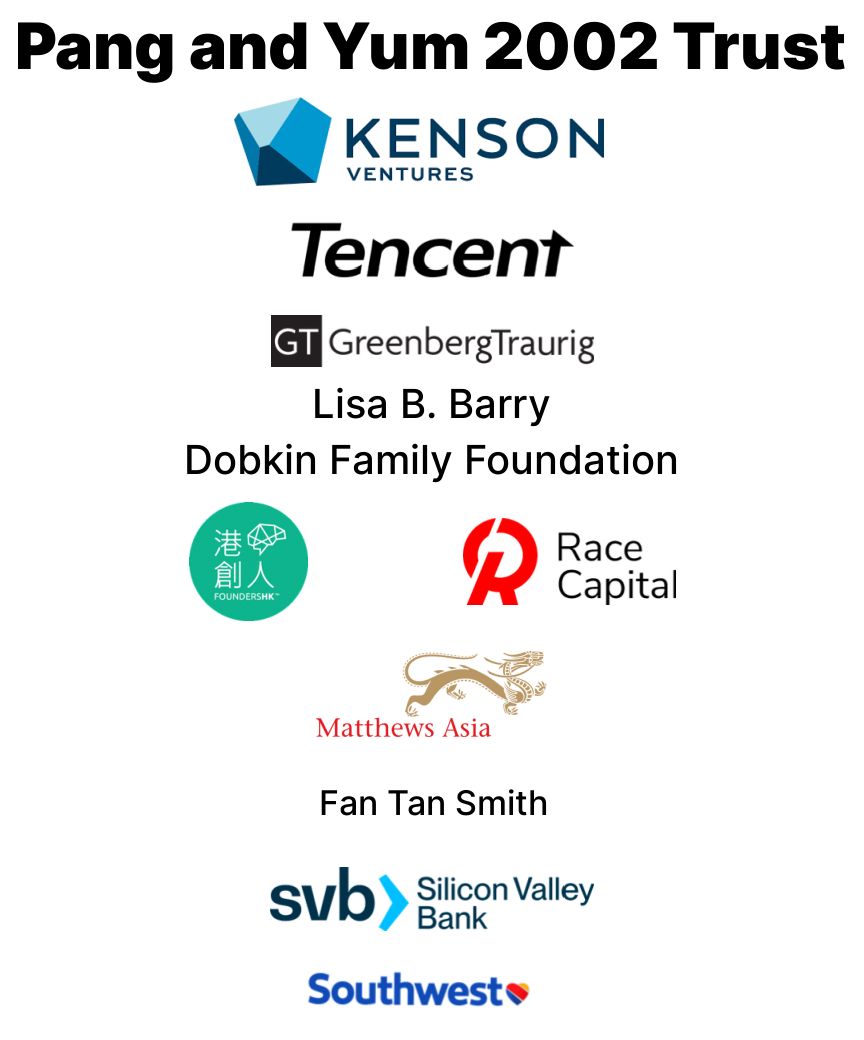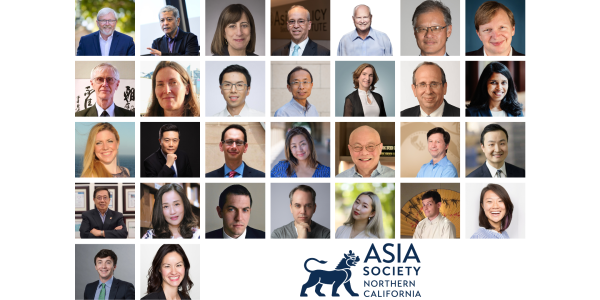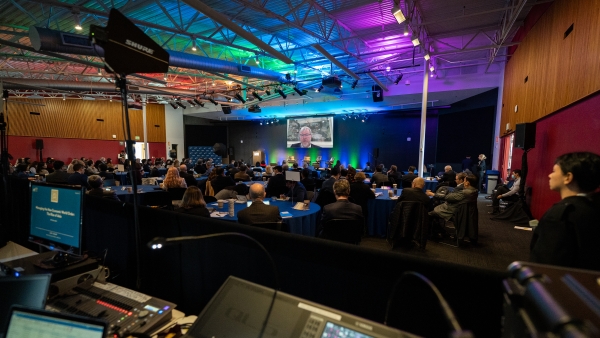The Future of U.S. & China: Moving Towards the Edge 2023
Event Recap With Images and Videos
Explore our online gallery for a vast selection of additional pictures by clicking here. Images by Wild Horse Productions.
On January 12, 2023 Asia Society Northern California hosted its fifth annual all-day U.S. & China Conference: The Future of U.S. & China: Moving Towards the Edge. This full-day event, took place at the Computer History Museum in Silicon Valley, CA, and featured leaders in business and trade, China experts, and journalists exploring the complex and evolving relationship between these two global powers. The event provided a diverse range of perspectives on various topics, including the emergence of Asia as a global power, the shifting dynamics of international trade, China's domestic politics, Taiwan and the semiconductor industry, the balance between competition and cooperation in finance, and how young professionals are navigating a changed China.
We've captured the event on video and will be sharing it here and on our YouTube channel in the coming weeks, along with photos. With a total of 31 speakers and 8 panel discussions, we'll be releasing one video per week. Be sure to subscribe to our channel and stay tuned for the release of these informative discussions.
| 9:00 - 9:05 a.m. |
Welcome Remarks
|
| 9:05 - 9:50 a.m. |
Session 1: Entangled Routes: The U.S., China, and the Evolving Global Trade OrderThis session was moderated by ASNC Advisory Council Member and Director of Government Affairs and Public Policy, Google, James Green, and featured Wendy Cutler, Vice President, Asia Society Policy Institute (ASPI) and Managing Director, ASPI, Washington, D.C. The speakers delved into the topic of changing global supply chains, noting that while data is currently anecdotal, they suspect we will see more and more production moving away from China to other Asian countries or Mexico. They discussed the status of 301 tariffs on exports from China to the U.S., how these will most likely remain in place under the current administration, and the repercussions of imposing tariffs unilaterally at the WTO level. They noted that WTO rules are outdated, that regional trade agreements are a way to go, discussed the Asia Pacific region’s stance on U.S.'s forming alliances such as IPEF, and revisions that could facilitate the U.S.'s reentry into the TPP. They honed in on the potential impact of a world recession on efforts to drive self-reliance and diversify trade partners. They elaborated on the importance of rules of origin, discussed the outlook of U.S.-China bilateral relations in 2023, and the long-term view of the Chinese economy. Lastly, they touched on the upcoming APEC meetings in 2023, to be hosted by the U.S. The importance of these meetings for the U.S. was emphasized, highlighting the potential for low-key negotiations between participating nations. Pro Tip: Read ASPI's report on Reimagining the TPP: Revisions that Could Facilitate U.S. Reentry. |
| 9:50 - 10:50 a.m. |
Session 2: How Semiconductors Make Taiwan One of The Most Important Places on EarthThe session was led by Orville Schell, ASNC Advisory Council Member and Vice President of the Center on U.S.-China Relations at Asia Society. Panelists included experts in their respective fields: Kirti Gupta, Vice President and Chief Economist at Qualcomm, provided an economic perspective; Edlyn Levine, Chief Science Officer and Co-Founder of America's Frontier Fund, shared her insights on national security, based on her scientific and physics expertise; Victor Wang, Founder and Managing Partner at AimTop Ventures, offered an investment perspective; and H.-S. Philip Wong, Willard R. and Inez Kerr Bell Professor at Stanford University's School of Engineering, contributed an academic perspective. The panelists began by highlighting the significance of semiconductors in the modern economy and the complex, global nature of the semiconductor industry. They then delved into the current geopolitical situation in Asia, specifically focusing on Taiwan's role as a major producer of semiconductors and a source of tension with China. The panelists emphasized that the global supply chain has many chokepoints, with Taiwan currently being a focal point. They acknowledged the trend of countries moving towards self-sufficiency and autonomy, but argued that complete independence in the global supply chain is not feasible. They suggested that limiting and containing this shift, promoting stability in the region, and creating multilateral alliances for resiliency would be the best solution. They also recommended learning from Taiwan's policies for creating advanced industries, and implementing policies that focus on value capture in order to commercialize inventions and technologies. Pro Tip: In August 2022, a team of scholars from the Asia Society Center on U.S.-China Relations and the Hoover Institution at Stanford University conducted a research trip to Taiwan, where they held meetings with political leaders, security experts, think tanks, and semiconductor companies. They shared their observations and reflections in a virtual session titled Chips, China, And Taiwan’s Security, A Report From The Field. |
| 10:50 - 11:00 a.m. |
Coffee & Tea Break |
| 11:00 - 11:30 a.m. |
Session 3: Managing the New Economic World Order – The Rise of Asia (live-streamed)In this presentation, Danny Quah, Dean and Li Ka Shing Professor in Economics, Lee Kuan Yew School of Public Policy, National University of Singapore, is discussing the role of nations like Singapore in the new world economic order, specifically in relation to the ongoing geopolitical rivalry between China and the United States. He argues that third nations should not be forced to choose sides in the geopolitical rivalry between these two powers, and that nations can have positive, mutually beneficial relationships without being friends or allies. Quah emphasizes the importance of establishing clear guidelines and a fair and equitable environment, as well as adherence to the rule of law, for these relationships to thrive. Quah's goal is for third nations to no longer be viewed as immaterial in relation to great power rivalry and for great powers to think about problem domains where their relationship can be positive and not zero-sum. |
| 11:30 a.m. - 12:15 p.m. |
Session 4: Cancer: Opportunity for Competition or Collaboration?The panel, led by Robeta Lipson, Founder of United Family Healthcare and Vice Chair at New Frontier Health, focused on the importance of U.S. China collaboration in healthcare, especially in cancer research. The panelists, representing various perspectives, emphasized the need for collaboration between the two largest sources of patients and pool of scientific minds. In the past, successful collaborations have led to advancements in cancer treatment but recent issues like cybersecurity, concerns about data sharing, genetic material rules, and government enmity have impeded it. The panel concluded that with proper handling of data and consent, obstacles could be overcome and collaboration could continue to have a positive impact globally. Dr. Bob Li, a Senior Fellow on Global Public Health at the Center for China Analysis, Asia Society Policy Institute (ASPI) and Physician Ambassador to China and Asia-Pacific, Memorial Sloan Kettering (MSK) Cancer Center, discussed the need for large-scale clinical trials in cancer treatment and gave the example of Astra Zeneca's Tagrisso as a success story of collaboration, which led to accelerated drug development and FDA approval. Dr. Alex Ng, Vice President, Tencent Healthcare highlighted the importance of global collaboration in advancing scientific discoveries and Tencent's investment in both the frontier of scientific development and the application of AI technology to address specific local social issues in China, such as the mismatch between patients and doctors and the lack of experience in rural colposcopies. Ken Fong, Founder and Chairman, Kenson Ventures, a biomedical professional, discussed his observations regarding Chinese nationals who obtained their PhD in the U.S., went on to establish successful firms, and eventually sold these companies to American businesses that greatly benefited from their innovative technology. He emphasized the importance of leveraging Chinese talent to keep the U.S. edge in innovation. Pro Tip: The Cure4Cancer Initiative, a partnership between ASPI and MSK Cancer Center, was mentioned as another successful international collaboration to combat cancer. The initiative aims to enhance cooperation between the U.S., China, and other nations in the shared fight against cancer. Click here to find out more. |
| 12:15 - 1:00 p.m. |
Lunch Break |
| 1:00 - 1:15 p.m. |
15 Minutes with Kevin Rudd, President and CEO, Asia Society (recorded message, 14 min., 27 sec.)In this pre-recorded video, Kevin Rudd provides an in-depth analysis of China's ongoing strategy towards the United States, as well as the United States' strategy towards China. He assesses the key elements of these strategies, evaluates the impact of the November 2022 summit between Chinese President Xi Jinping and President Biden on the relationship between the two nations, and examines the global ramifications of military tensions between the two countries. |
| 1:15 - 2:00 p.m. |
Session 5: The Politics of U.S.-China Relations: Irreconcilable Differences or Possibilities of Progress?The panel discussion, led by Mary Kay Magistad, Deputy Director of Asia Society's Center on U.S. - China Relations, and featuring Jim Messina, CEO of The Messina Group, and Lingling Wei, Chief China correspondent at The Wall Street Journal, focused on the complex and multi-layered politics of U.S.-China relations. Both countries face economic challenges and have strong nationalistic populations, resulting in a view of each other as both competitors and important trading partners. However, lack of communication on all levels is a significant problem, and despite bipartisan agreement in the U.S. to confront China, there is also a lack of understanding between the two countries, including their domestic tensions. The Chinese leadership is in heightened competition with the U.S. but has recently taken a more pragmatic approach due to domestic issues such as a struggling economy and youth unemployment. The discussion also covered the new select committee in the House on China, with different focuses on issues such as intellectual property, trade deficits, privacy spying, human rights, and the environment by Republicans and Democrats. The recent protests in China against zero COVID policies were also discussed, as they highlighted the growing sense of empowerment among young Chinese people and the challenges this poses for the country's leadership. Overall, the panel emphasized the need for better communication and understanding between the U.S. and China, while identifying areas where the two countries can work together. |
| 2:00 - 2:45 p.m. |
Session 6: Young, Bilingual and Wondering What’s Next: How NextGen Professionals are Coping with a Changed ChinaThis session was led by Mark Cohen, ASNC Advisory Council Member and Senior Fellow and Director of the Asia IP Law Project at the University of California Berkeley Center for Law & Technology. Panelists included emerging talent in their respective fields: Jesse Appell, Bilingual Comedian, Artist, and New Media Entrepreneur at U.S.-China Comedy Center; Clay Garner, Civic Technologist and Schwarzman Scholar; Alina Luk, Product Manager at FIgma and Schwarzman Scholar; and Marrian Zhou, Reporter at Nikkei Asia. This panel highlighted the panelists’ individual experiences as young professionals and their views on the future of their careers in light of changing U.S.-China relations. Panelists began by sharing their personal observations of China during their time abroad and how these reflections became the frameworks with which they approach their work. They emphasized how U.S. institutions can learn from existing Chinese physical and digital infrastructure. They shared how censorship has impacted their careers and the importance of seeking out diverse discourse and media in both countries despite these challenges. The panelists then discussed their roles as cultural bridges between the U.S. and China. They acknowledged that although people from both countries want to engage with each other, political relations between the two nations have hindered their ability to do so. They emphasized the importance of learning language with the intention of empathetically engaging with different cultures and recognizing the other side as human rather than a political entity. The panel also addressed questions from the audience about demanding better governance, contextualizing Chinese experiences for U.S. employers, entrepreneurship in China, and ended with a demonstration of Chinese Xiangsheng comedy. |
| 2:45 - 3:00 p.m. |
Coffee & Tea Break |
| 3:00 - 3:45 p.m. |
Session 7: China’s Economic Outlook: Bullish or Bearish? (live-streamed)This panel was moderated by Asia Society Northern California Advisory Council Member Andy Rothman, Investment Strategist at Matthews Asia. Panelists included Guonan Ma, Senior Fellow on Chinese Economy at the Asia Society Policy Institute, Center for China Analysis; Tom Orlik, Chief Economist at Bloomberg; Jacob Rothman, Founder and Co-CEO at Velong Enterprises; and Edith Yeung, General Partner at Race Capital. This panel addressed whether the panelists felt bullish or bearish about China’s economic outlook with regard to the future of different industries in the short and long terms. The panelists examined the role of the Chinese consumer in an economy of high unemployment, reduced pay, and a reluctance to spend. They discussed that this could change under the end of the zero COVID policy and the willingness of companies to operate in China which would introduce more jobs. The discussion then turned to the prospects of private enterprises and the importance of having strong collaboration between the state and private sectors for common prosperity. The panelists also shared what they considered to be the biggest risks such as long-term security in terms of staying in China, the future of U.S.-China diplomacy, the lack of a robust private sector, and the lack of access to foreign technology. The panel ended by answering questions from the audience about China’s transition to a green economy and the rise of government party cells in corporate boardrooms. |
| 3:45 - 4:30 p.m. |
Session 8: Prospect for Progress - How Can the U.S. & China Best Use the Period Ahead?This session was led by Gary Rieschel, Chair at Asia Society Northern California and Founding Managing Partner of Qiming. Panelists included Danny Russel, Vice President for International Security and Diplomacy at the Asia Society Policy Institute and Jerry Yang, Founding Partner of AME Cloud Ventures and Co-Founder of Yahoo! Inc.
|
| 4:30 - 4:35 p.m. |
Closing Remarks
|
| 4:35 - 5:00 p.m. |
Networking |
THANK YOU TO OUR SPONSORS


